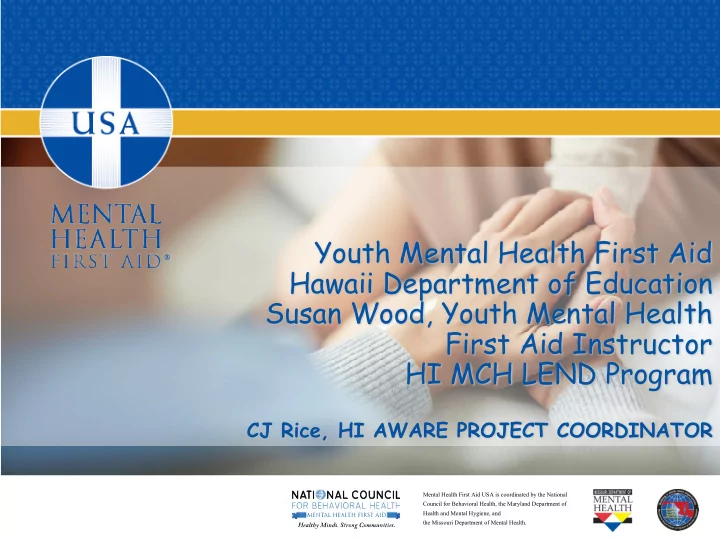

Youth Mental Health First Aid Hawaii Department of Education Susan Wood, Youth Mental Health First Aid Instructor HI MCH LEND Program CJ Rice, HI AWARE PROJECT COORDINATOR Mental Health First Aid USA is coordinated by the National Council for Behavioral Health, the Maryland Department of Health and Mental Hygiene, and the Missouri Department of Mental Health.
Objectives What is Project HI AWARE History of Youth Mental Health First Aid Benefit of Youth Mental Health First Aid Sample of Curriculum > Median Age of Onset > Risk Factors > Protective Factors Outcomes in Hawaii Becoming a Youth Mental Health First Aider 1
Project HI AWARE $2.5 million/year for 5 years from SAMHSA and UHDOE State DOE, focusing on 3 Complex Areas Year 4 focus on addressing and supporting the mental health needs of children Providing resources and support in complex areas 2
Mental Health First Aid is the initial help offered to a person developing a mental health or substance use problem, or experiencing a mental health crisis. The first aid is given until appropriate treatment and support are received or until the crisis resolves. 3
Government Support 4
Mental Health First Aid Originated in Australia and currently in 23 countries Adult course for individuals 18 years of age and older Youth Mental Health First Aid is designed to teach caring adults how to help an adolescent who is experiencing a mental health, an addictions challenge or is in crisis Mental Health First Aid Included in SAMHSA’s National Registry of Evidence-based Programs and Practices 5
Why Mental Health First Aid? 6
Where Mental Health First Aid Can Help Prevention Early Intervention Treatment Well Becoming Unwell Unwell Recovering Where Mental Health First Aid can help on the spectrum of mental health interventions 7
Youth Mental Health First Aid Introduces participants to the unique risk factors, protective factors and warning signs of mental health problems in adolescents Builds understanding of the importance of early intervention Teaches individuals how to help an adolescent in crisis or experiencing a mental health challenge The course is designed for adults who regularly interact with adolescents (teachers, school staff, coaches, youth group leaders, parents, etc.) 8
What Participants Learn Risk factors and warning signs of mental health and substance use problems Information on depression, anxiety, trauma, psychosis and substance use A 5-step action plan to help someone who is developing a mental health problem or in crisis Available evidence-based professional, peer and self-help resources 9
Mental Health First Aid Action Plan A ssess for risk of suicide or harm L isten nonjudgmentally G ive reassurance and information E ncourage appropriate professional help E ncourage self-help and other support strategies 10
Median Age of Onset ? 11
Median Age of Onset One-half of all lifetime cases of mental illness begin by age 14, three-quarters by age 24 > Anxiety Disorders – Age 11 > Eating Disorders – Age 15 > Substance Use Disorders – Age 20 > Schizophrenia – Age 23 > Bipolar – Age 25 > Depression – Age 32 12
Kaua ʻ i Longitudinal Study ? 13
Risk Factors and Protective Factors Environments Supports Behaviors 14
Who we’ve trained: On all Hawaiian Islands 1) Hawaii Department of Education Staff/Schools: Administrators, Counselors, Teachers, Special Education, SBBH, Security, Staff, EAs, SHAs (50% Trained/Instructors) 2) First Responders: Doctors, Nurses, Public Health Nurses, FBI, Police Department, Fire Dept., Pre-Med and Pre-Health Career College Students 3) Community Members: Non-Profit Agencies, State Agencies, Colleges, Faith Based Organizations, Parents, Families, Grandparents, Caregivers
Hawaii Youth Mental Health First Aid Current Statistics 85 Youth Mental Health First Aid Instructors over four islands and fourteen complex areas. Trained a total of more than 2500+ Youth Mental Health First Aiders 16
Who We’re Reaching 9.7% Other 1.2% Business/Corporations 11% Schools 3.0% Faith Communities 9.3% Law Enforcement/Public Safety 2.6% Primary Care 10.7% Social Services 6.4% Higher Education 7.0% Behavioral Health 38.7% General Community/Not Specified 30,000 Courses (through September 2015 ) 17
Hawaii Statistics: 2,500+ Trained in 2 Years 180+ Trainings and 85 Instructors over 6 islands Last Quarter Oct-Dec 2017: 340 Trained
Referrals from Mental Health First Aiders: Youth-1. Anxiety/Stress, 2. Suicide/Self Harm
21
4 Reasons to Become a Mental Health First Aider 22
Who should be trained? Any adult working with, having contact with youth Training will be open to all school staff Community Look for Youth Mental Health First Aid events in Hawaii on www.eventbrite.com and www.mentalhealthfirstaid.org 23
The Value of Mental Health First Aid 24
Takeaways? 1) Early identification! Please take the training! 2) MAMA – M eaningful A dult, M eaningful Activity ASK YOUR CHILDREN Who can they talk to in the school? Community? What activity is meaningful to them? 25
26
Take a Course You could be the help someone needs Find a Course or Instructor near you: www.MentalHealthFirstAid.org www.Eventbrite.com goo.gl/AR4Ogz Contact Us in Hawaii: DOE Project HI-AWARE crice@hawaiidoe.k12.hi.us 808-305-9798 Mental Health First Aid USA is coordinated by the National Council for Behavioral Health, the Maryland Department of Health and Mental Hygiene, and the Missouri Department of Mental Health.
Recommend
More recommend